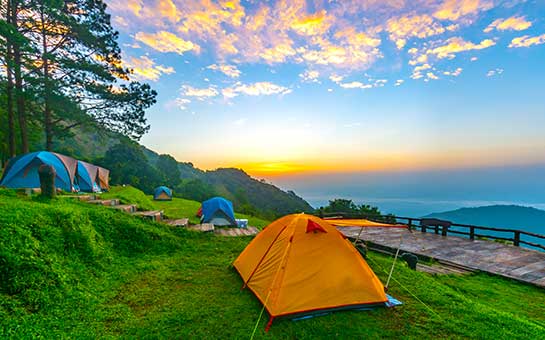Are you fascinated by the great outdoors? Then camping is the most versatile adventure activity that you can pick up. Trek through the day, and spend the night sleeping under the stars or cuddled up inside a tent. Camping is bound to bring you closer to nature.
Camping is a popular activity for nature enthusiasts of all ages. It's a great way to get away from the hustle and bustle of your everyday life and relax in the welcoming arms of nature.
Though camping seems idyllic, it has its fair share of risks. Secure yourself with camping insurance to make sure any unexpected injuries or accidents don’t have an impact on your finances.
History and Tips for Camping
Travelers and traders throughout history have camped when the need arose. But recreational camping started in the late 19th century when a British traveling tailor, Thomas Hiram Holding, popularized camping by the Thames. Back then, camping gear was bulky and often transported on the river. It was initially a pastime for the elites. But the development of the modern camping gear made it accessible to everyone.
Before you go out camping, ask the locals about the spot you have chosen as your campsite. Some places are riskier than others. You might run into unsavory characters or wild animals. Learning more about the place you are camping will minimize the risk. It also reduces the chances of you mistakenly consuming or touching poisonous or irritating plant life.
If you are planning to go camping for a prolonged period, then pick a spot near a water source, and carry extra food and camping equipment. You never know if weather conditions might delay your return, and you don't want to go hungry.
Your camping gear depends on the activities you have planned. But some basic things to carry include flashlights, a first aid kit, fire starters, and tents. If you go camping in a more extreme location, then add an emergency flare. You will need well-insulated tents and sleeping bags if you camp out during winter or in an especially cold region. Camping equipment insurance might also be a good idea in case it is not covered under your renters or auto insurance policy.
Do not go camping alone. If an accident occurs, you will need someone to help you get medical care. If you’re in a remote area, then your camping partner will be your only hope. Pick up some basic bushcraft and first aid skills before going camping. And be sure to leave information about your travel plans with a family member or trusted friend.
Why Buy Camping Travel Insurance?
Camping outdoors can be risky. Snakebites and spider-bites are a common issue and could require medical treatment. Run-ins with larger animals are rare and only happen when inexperienced and foolhardy campers push too far deep into forest reserves. Be sure to safely dispose of any leftover food so that it doesn’t attract animals overnight. However, any wild animal attack should be immediately treated.
Other risks can vary depending on terrain and weather. Sprains and falls are more prevalent in rocky areas, while insect-borne diseases are common in wetlands and forests. Cholera, diarrhea, and a host of other waterborne diseases can be caused by drinking untreated water.
No matter where you go camping, it's best to secure yourself with camping travel insurance.
Travel Insurance for Camping
Camping is a wonderful outdoor activity to reduce your stress. Don't let your camping experience get marred by errant medical bills.
Many standard travel insurance plans don’t include coverage for potentially risky activities like camping. But you can skip that headache by buying a hazardous sports travel insurance plan as camping travel insurance or RV travel insurance. Be sure to read the fine print before purchase to be sure you’re covered, and then go camping under the open sky with peace of mind.

